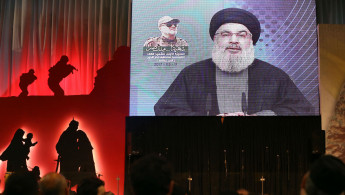Tensions escalate in Israel, Hizballah war of words
Simmering tensions between Israel and Lebanon's powerful Hizballah group have escalated in recent days, with both sides issuing barbed threats regarding any future war.
Hizballah leader Hassan Nasrallah on Friday said that a future conflict with Israel could draw thousands of fighters from countries including Iran and Iraq, warning Israel against attacking Lebanon.
"The Israeli enemy must know that if an Israeli war is launched against Syria or Lebanon, it is not known that the fighting will remain Lebanese-Israeli, or Syrian-Israeli," Nasrallah said in a televised speech.
The Hizballah chief said while neighbouring states might not directly intervene, "thousands, even hundreds of thousands" of fighters from Iraq, Yemen, Iran, Afghanistan and Pakistan could participate in any future war.
Experts on the group say the Nasrallah's warnings are part of a policy of deterrence that has in the past included revealing some of its military capabilities.
In recent months, he said the group's rocket arsenal could hit any military target in Israel.
 |
The Hizballah chief said thousands of fighters from Iraq, Yemen, Iran, Afghanistan and Pakistan could participate in any future war. |  |
Nasrallah's comments came just days after the head of Israel's air force said the country would have "unimaginable" military power at its disposal to fight the Iranian-backed group if war broke out.
"What the air force was able to do quantitatively in the... Lebanon war over the course of 34 days we can do today in 48-60 hours," Major General Amir Eshel told a security conference in Herzliya, near Tel Aviv, this week.
"This is potential power unimaginable in its scope, much different to what we have seen in the past and far greater than people estimate."
Eshel said Israel must strike hard and fast in case of conflict, warning Lebanese civilians of a high potential of "collateral damage" if they did not flee any future fighting.
"If before the eruption of hostilities, or right when they begin, Lebanese residents were to leave those places they will not be hit," referring to Hizballah's military infrastructure in the south.
Border Tensions
On Thursday, Israel accused Hizballah of expanding observation posts along the border under the cover of an environmental NGO, calling it a "dangerous provocation."
Israel's ambassador to the UN, Danny Danon, sent a letter of protest to the Security Council with images of the alleged observation posts and maps locating them, accusing the group of conducting military activites under the guise of a civilian environmental NGO Green Without Borders.
The UN, however, reject the allegations, with peacekeeping mission UNIFIL saying the NGO had planted trees in the area but had not observed any "unauthorized armed persons at the locations or found any basis to report a violation of resolution 1701."
 |
In 2006, a month-long war between Israel and Hizballah killed more than 1,200 Lebanese civilians |  |
In 2006, a month-long war between Israel and Hizballah killed more than 1,200 Lebanese civilians, displaced over one million, and devastated infrastructure in the country.
Tens of thousands of Lebanese homes were destroyed or damaged by intense Israeli artillery and naval bombardments.
One such airstrike in Qana killed 26 civilians. A decade earlier, the town was the sight of one of the deadliest massacres in the Israeli-Arab conflict, with 100 Lebanese civilians killed in Israeli shelling of a UN base.
Israeli officials contended that the high fatality rate in the 2006 war was due to Hizballah's use of hiding among civilians and using "human shields", an allegation also frequently made during military operations in Gaza.
Human rights groups refuted the claim.
Around 160 Israelis died in the fighting, mostly soldiers, with Hizballah rockets hitting major urban centres such as Haifa, Nazareth, and Acre. The war was considered a political and military failure in Israel.





 Follow the Middle East's top stories in English at The New Arab on Google News
Follow the Middle East's top stories in English at The New Arab on Google News


